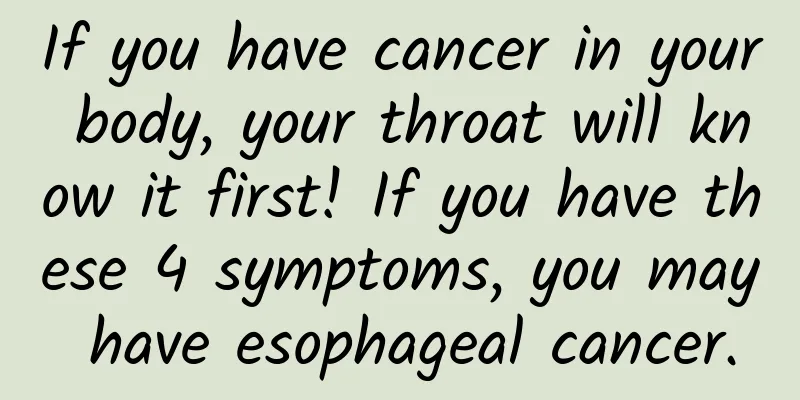How long after ovulation can pregnancy be detected?

|
Women who are preparing for pregnancy undoubtedly know that it is easiest to conceive after ovulation. Therefore, many people, when they know their ovulation period, are eager to check whether they are pregnant. However, can you test it as soon as you ovulate? How long after ovulation can you test for pregnancy? Next, follow the editor to find out! How long after ovulation can I detect pregnancy? Ovulation is the whole process of the perfect egg cell being released from the ovum. When a woman is born, there are about 300,000 to 600,000 eggs in the ovaries and uterus of both sides. However, in a person's lifetime, only about 400 eggs can grow and develop to maturity, and the rest decline. The process of the mature follicle rupturing, the egg being released from the ovary and falling into the abdomen is called ovulation. Ovulation usually occurs about 14 days before the menstrual period. For example, if your menstrual period starts on October 28, then around October 14 is your ovulation period. Since the average survival and fertilization time of the egg cell is 12 to 24 hours, if you want to get pregnant, you have to have sex 1 to 2 days before ovulation or within 24 hours after ovulation to get pregnant. The principle of pregnancy test is to detect human chorionic gonadotropin (hCG) in the body's urine. Generally, trophoblasts begin to secrete a small amount of hCG on the 6th day after ovum fertilization, and hCG can be detected in the blood about 1 day later. This is the most sensitive way to detect pregnancy, and the positive hCG reaction in urine will appear later than in blood. Although many pregnancy test strips indicate that women can take a pregnancy test one day after missing their normal menstrual period, in fact, the sensitivity of each pregnancy test strip is different, and the test varies from person to person. How long after ovulation can pregnancy be detected? Initially, pregnancy can be detected based on blood hCG 7-10 days after ovulation, but due to the small amount of hCG in the early stages of pregnancy, it is not easy to detect. If you use an early pregnancy test strip, you can check whether you are pregnant two weeks after ovulation. How to test for pregnancy after ovulation One is the early pregnancy test paper. If you are in early pregnancy, it is best to use morning urine for the test. Because of the extraction of morning urine, hCG levels are higher. Generally, a test 2 weeks after intercourse can confirm whether you are pregnant. The second is B-ultrasound examination. The time for B-ultrasound detection of early pregnancy is usually about a week late in menstruation. You can go to the hospital for B-ultrasound examination to see if you are pregnant. If you see a pregnancy halo under B-ultrasound, it means you are pregnant. The main purpose of B-ultrasound examination in early pregnancy is to confirm intrauterine pregnancy, rule out ectopic pregnancy and trophoblastic disease, estimate gestational age, and rule out pelvic masses or uterine abnormalities. Generally, a gestational sac can be seen in the uterine cavity 35 days after menstruation; at 6 weeks of pregnancy, the fetal bud and the initial primitive heart tube beating can be seen. The third is to test blood HCG. The early stage of pregnancy can be confirmed by testing blood HCG 10 days after intercourse. This is the earliest and most accurate testing method at present. The fourth is to measure body temperature during ovulation. For women who are planning to get pregnant, they can use basal body temperature measurement to detect whether they are pregnant. Generally, a girl's body temperature is below 36.5 degrees before ovulation, and rises by 0.3-0.5 degrees after ovulation. If the egg cannot be fertilized, estrogen levels will decrease after about a week and the body's temperature will return to normal. If you are pregnant, your body temperature should be kept at a high level. The time for this type of early pregnancy test starts from the time when you are not pregnant until one week after ovulation. If the high temperature condition persists after one week and lasts for more than 18 days, pregnancy can be confirmed. |
<<: Ovulation test paper weak positive, definitely not pregnant
>>: Why do I have nipple pain after ovulation?
Recommend
Drinking is harmful to your health. Here are 3 signs that you need to put down your glass and stop "self-harming"
Since the advent of alcohol, human beings have al...
What medicine should women use for knee pain
Knee pain and swelling are usually caused by arth...
How to dress a fat woman
People often say that clothes make the man, and s...
The mother has hereditary ataxia
We often say that if a woman is mentally ill, she...
How to treat menstrual migraine
Menstrual period is a special stage for women. Du...
Early symptoms of pituitary tumors in women
Nowadays, the frequency of pituitary tumors is ge...
Why do some women have small breasts and small nipples?
Breasts are a female gender characteristic and th...
Fruits that taste sour may contain high sugar content? Can people who control their sugar intake still eat them?
When it comes to fruits, many people think of hea...
What are the benefits of nectarine juice? How to squeeze nectarine juice
The nutritional value of peach and apple juice is...
Why does the pregnant woman have pain on the right side of her lower abdomen?
The physical health of pregnant women is very imp...
What are the main varieties of sugarcane? Can I eat sugarcane if I have a cough?
The dry seasons of autumn and winter often make p...
When does breast tenderness disappear after pregnancy?
Some pregnant women may experience breast pain in...









